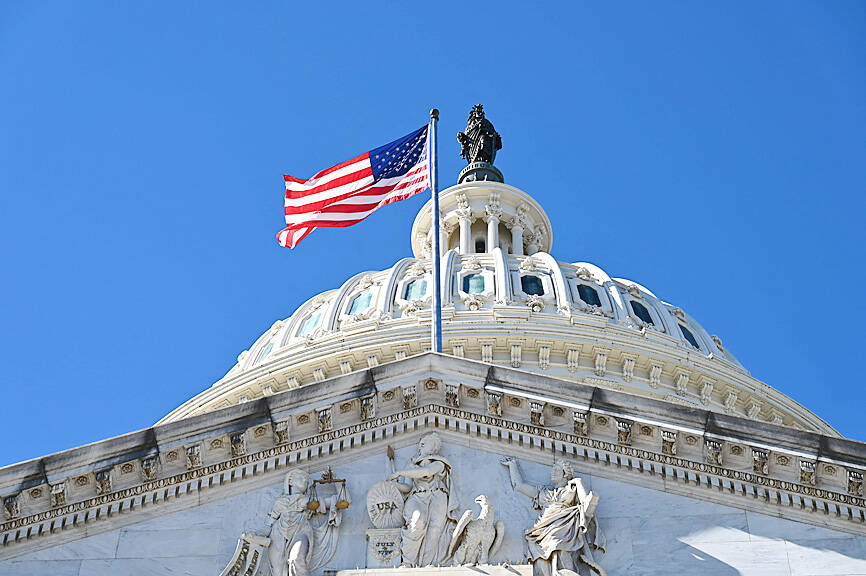A US$95.34 billion bill that includes aid for Taiwan, Ukraine and Israel on Thursday advanced in the US Senate after Republicans blocked compromise legislation that included a long-sought overhaul of immigration policy.
Senators backed a procedural motion by 67-32, exceeding the 60-vote threshold to advance the bill. Seventeen Republicans voted in favor of it, in a surprising shift after they blocked the broader bill on Wednesday.
“This is a good first step. This bill is essential for our national security, for the security of our friends in Ukraine, in Israel, for humanitarian aid for innocent civilians in Gaza, and for Taiwan,” Senate Majority Leader Chuck Schumer said in the Senate after the vote.

Photo: AFP
Failure to pass the bill would “only embolden autocrats like [Russian President Vladimir] Putin and [Chinese President] Xi [Jinping (習近平)] who want nothing more than America’s decline,” Schumer said.
There was no immediate word on when the 100-member chamber would consider final passage, as some senators said they expected to remain in session during the weekend if necessary.
“We are going to keep working on this bill until the job is done,” Schumer said.
The Democratic-led Senate took up the security aid bill after Republicans on Wednesday blocked a broader measure that also included reforms of border security and immigration policy that a bipartisan group of senators had negotiated for months.
The security aid bill includes US$4.83 billion to support partners in the Indo-Pacific, including Taiwan, and deter aggression by China, US$61 billion for Ukraine as it battles a Russian invasion and US$14 billion for Israel in its war against Hamas.
It would also provide US$9.15 billion in humanitarian assistance to civilians in Gaza and the West Bank, Ukraine and other populations in conflict zones around the globe.
The Senate is expected to take days to agree on a final version of the security aid package, with some Republicans continuing to push for amendments. Supporters of Ukraine have been struggling for much of the past year to find a way to send more money to help Ukrainian President Volodymyr Zelenskiy’s government.
Even if the aid bill eventually passes the Senate, it faces uncertainty in the US House of Representatives.
Dozens of Republican House members, particularly those most closely allied with former US president Donald Trump, have voted against Ukraine aid, including House Speaker Mike Johnson.
While lawmakers have approved more than US$110 billion for Ukraine since Russia invaded in February 2022, the US Congress has not passed any major aid for Kyiv since Republicans took control of the House in January last year.
Supporters of Ukraine aid say Washington and its partners must send a unified message to Russia as well as globally.
US allies agree.
Polish Prime Minister Donald Tusk wrote on social media that Republican senators should be ashamed for blocking the Ukraine aid package, saying that former US president Ronald Reagan would be “turning in his grave.”
The Kremlin said that Putin and Xi spoke by telephone on Thursday and both rejected what they called US interference in the affairs of other countries.
Additional reporting by CNA

AT RISK: The council reiterated that people should seriously consider the necessity of visiting China, after Beijing passed 22 guidelines to punish ‘die-hard’ separatists The Mainland Affairs Council (MAC) has since Jan. 1 last year received 65 petitions regarding Taiwanese who were interrogated or detained in China, MAC Minister Chiu Chui-cheng (邱垂正) said yesterday. Fifty-two either went missing or had their personal freedoms restricted, with some put in criminal detention, while 13 were interrogated and temporarily detained, he said in a radio interview. On June 21 last year, China announced 22 guidelines to punish “die-hard Taiwanese independence separatists,” allowing Chinese courts to try people in absentia. The guidelines are uncivilized and inhumane, allowing Beijing to seize assets and issue the death penalty, with no regard for potential

STILL COMMITTED: The US opposes any forced change to the ‘status quo’ in the Strait, but also does not seek conflict, US Secretary of State Marco Rubio said US President Donald Trump’s administration released US$5.3 billion in previously frozen foreign aid, including US$870 million in security exemptions for programs in Taiwan, a list of exemptions reviewed by Reuters showed. Trump ordered a 90-day pause on foreign aid shortly after taking office on Jan. 20, halting funding for everything from programs that fight starvation and deadly diseases to providing shelters for millions of displaced people across the globe. US Secretary of State Marco Rubio, who has said that all foreign assistance must align with Trump’s “America First” priorities, issued waivers late last month on military aid to Israel and Egypt, the

‘UNITED FRONT’ FRONTS: Barring contact with Huaqiao and Jinan universities is needed to stop China targeting Taiwanese students, the education minister said Taiwan has blacklisted two Chinese universities from conducting academic exchange programs in the nation after reports that the institutes are arms of Beijing’s United Front Work Department, Minister of Education Cheng Ying-yao (鄭英耀) said in an exclusive interview with the Chinese-language Liberty Times (the Taipei Times’ sister paper) published yesterday. China’s Huaqiao University in Xiamen and Quanzhou, as well as Jinan University in Guangzhou, which have 600 and 1,500 Taiwanese on their rolls respectively, are under direct control of the Chinese government’s political warfare branch, Cheng said, citing reports by national security officials. A comprehensive ban on Taiwanese institutions collaborating or

France’s nuclear-powered aircraft carrier and accompanying warships were in the Philippines yesterday after holding combat drills with Philippine forces in the disputed South China Sea in a show of firepower that would likely antagonize China. The Charles de Gaulle on Friday docked at Subic Bay, a former US naval base northwest of Manila, for a break after more than two months of deployment in the Indo-Pacific region. The French carrier engaged with security allies for contingency readiness and to promote regional security, including with Philippine forces, navy ships and fighter jets. They held anti-submarine warfare drills and aerial combat training on Friday in